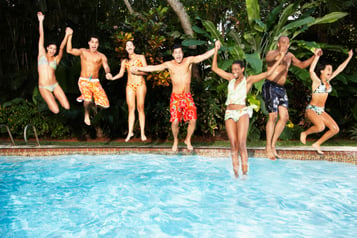How to Practice Electrical Safety Around the Swimming Pool
[fa icon="calendar"] August 15, 2014 / by Home Services Expert
 School may be starting soon, but there are still plenty of warm days to spend time in the swimming pool. No one – probably the least of all you – wants to throw cold water on a festive pool party.
School may be starting soon, but there are still plenty of warm days to spend time in the swimming pool. No one – probably the least of all you – wants to throw cold water on a festive pool party.
Practicing electrical safety around a swimming pool is three parts your responsibility – since you're the person in charge – and one part that of the guest or reveler.
If an Electrical Device Falls Into the Pool
For example, you might wish to remind people that electronic devices do not short out if they happen to drop into or become submerged in water. In fact, if the power is still “on,” the device will continue to function. So it behooves you to watch to ensure that one tries to retrieve an electronic device from your swimming pool. The water could be electrified, and the person touching it could receive a severe shock -- or worse.
Instead, if a device tumbles into your pool, unplug the device before touching it. Never try to retrieve an electrical device from your pool until it is unplugged. Remember an electrical truism: the greater the electrical current and the longer its duration, the greater the danger of an electrical shock. A low-voltage device doesn't equate to a low hazard.
The Best Electrical Safety Advice: Have Your Pool Inspected
Before you champion electrical safety around your swimming pool and communicate the warnings to your family, friends and other guests, the single most important precaution you can take is having your pool inspected by a licensed local electrician from Experts In Your Home. They will check that the pool and the outlets and lights around it conform with the National Electrical Code, which sets electrical safety standards. If you're not certain where all the switches and circuit breakers for your pool are located – and you should, especially in case of an emergency – this would be a great time to ask.
An electrician also will ensure that you practice sound electrical safety around your swimming pool by:
- Wearing rubber-soled shoes and keeping your hands and feet dry when you come into contact with electrical devices. Never touch devices or wires when you are wet or may come into contact with wet surfaces.
- Being mindful of any overhead power lines. If they're nearby – and they really shouldn't be within 25 feet of your pool anyway – keep any long-armed tools you use to clean your pool close to the ground or the water's surface.
- Counting off 25 feet between any outdoor electrical outlets (or receptacles) and the water's edge and protecting the outlets with ground-fault circuit interrupters. GFCIs are your very best protection against electrocution; they will automatically cut electrical power if they detect the presence of water. You might wish to use portable GFCIs where permanent GFCI outlets are not available.
- Using extension cords sparingly, if at all. They should never be damaged or cobbled together with tape. And they should be kept at least 5 feet away from the water's edge.
- Using battery-operated devices whenever possible.
If you're really cautious, you might wish to create a “What to do in case of emergency” poster to hang on a wall near your pool. Its presence alone will communicate that you take swimming pool safety seriously. And besides, you can't possibly supervise your pool every second.
If you suspect that someone in your pool is experiencing an electrical shock, immediately cut all the power to your pool and then call 911.
Hopefully, it will never come to that because you'll remember that the first step toward practicing sound electrical safety around your swimming pool is contacting Experts In Your Home for a pool inspection. Our licensed local Chico electricians are here to help.
For more ways to stay safe download our free electrical safety guide below:



